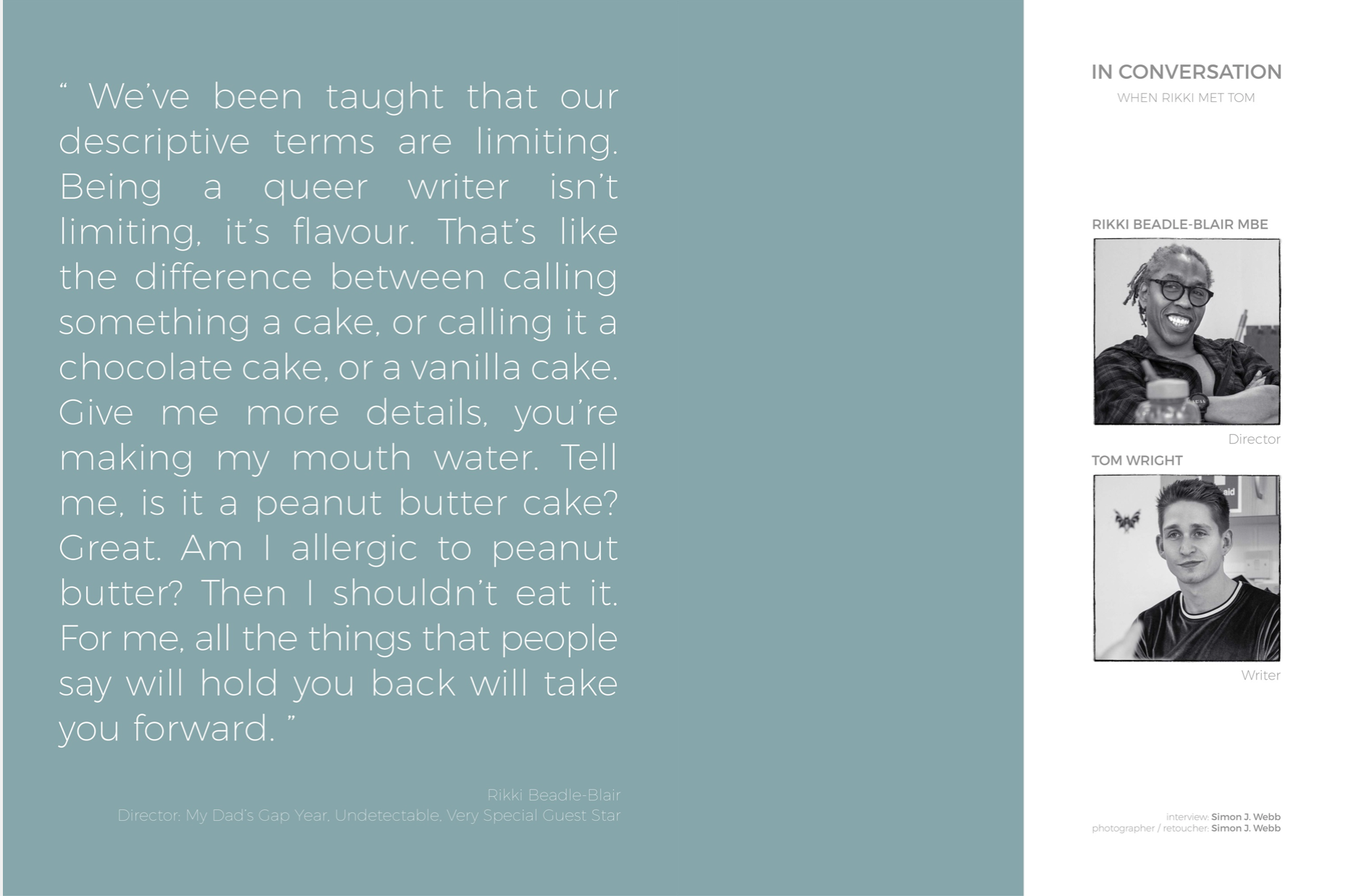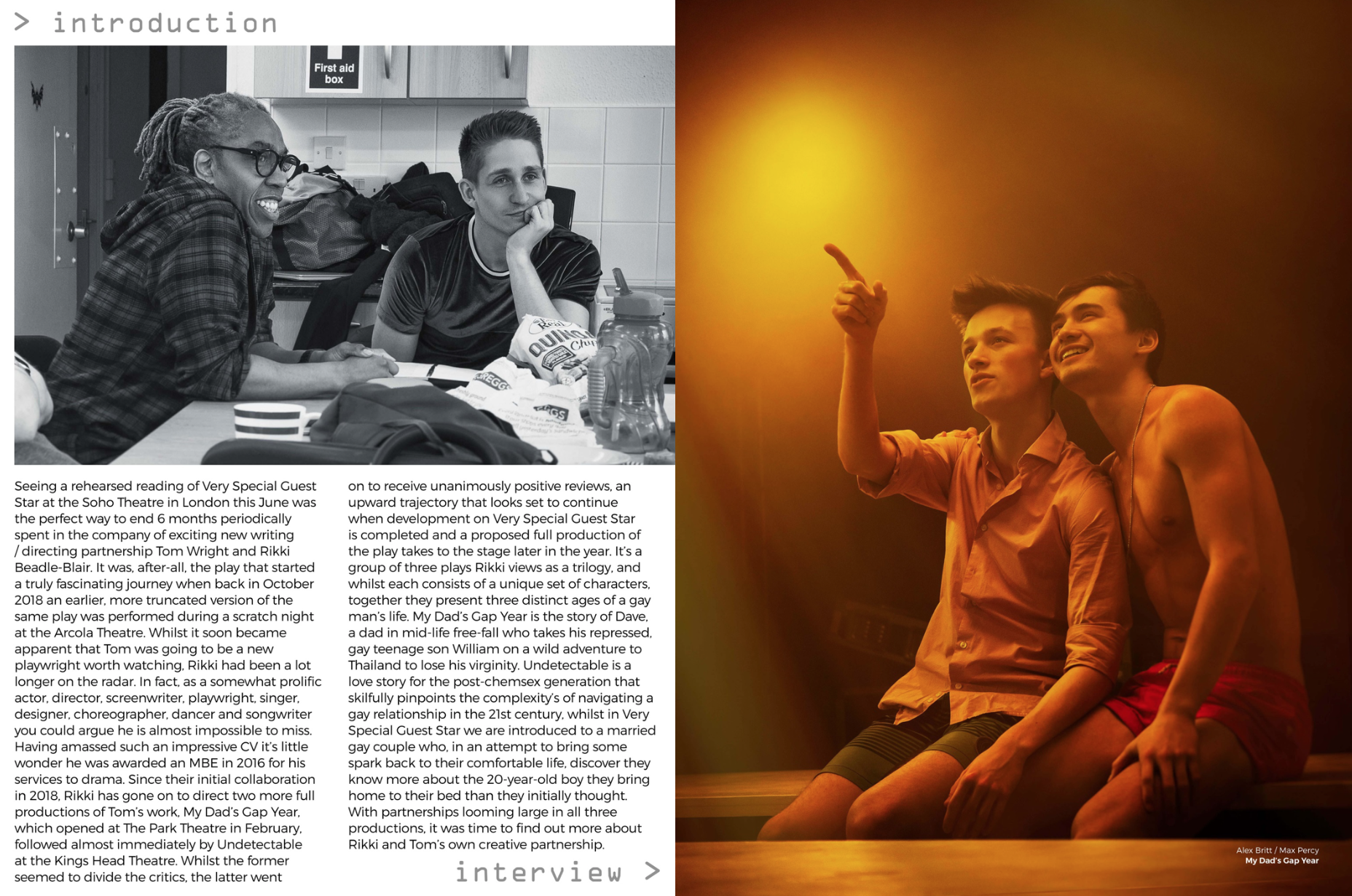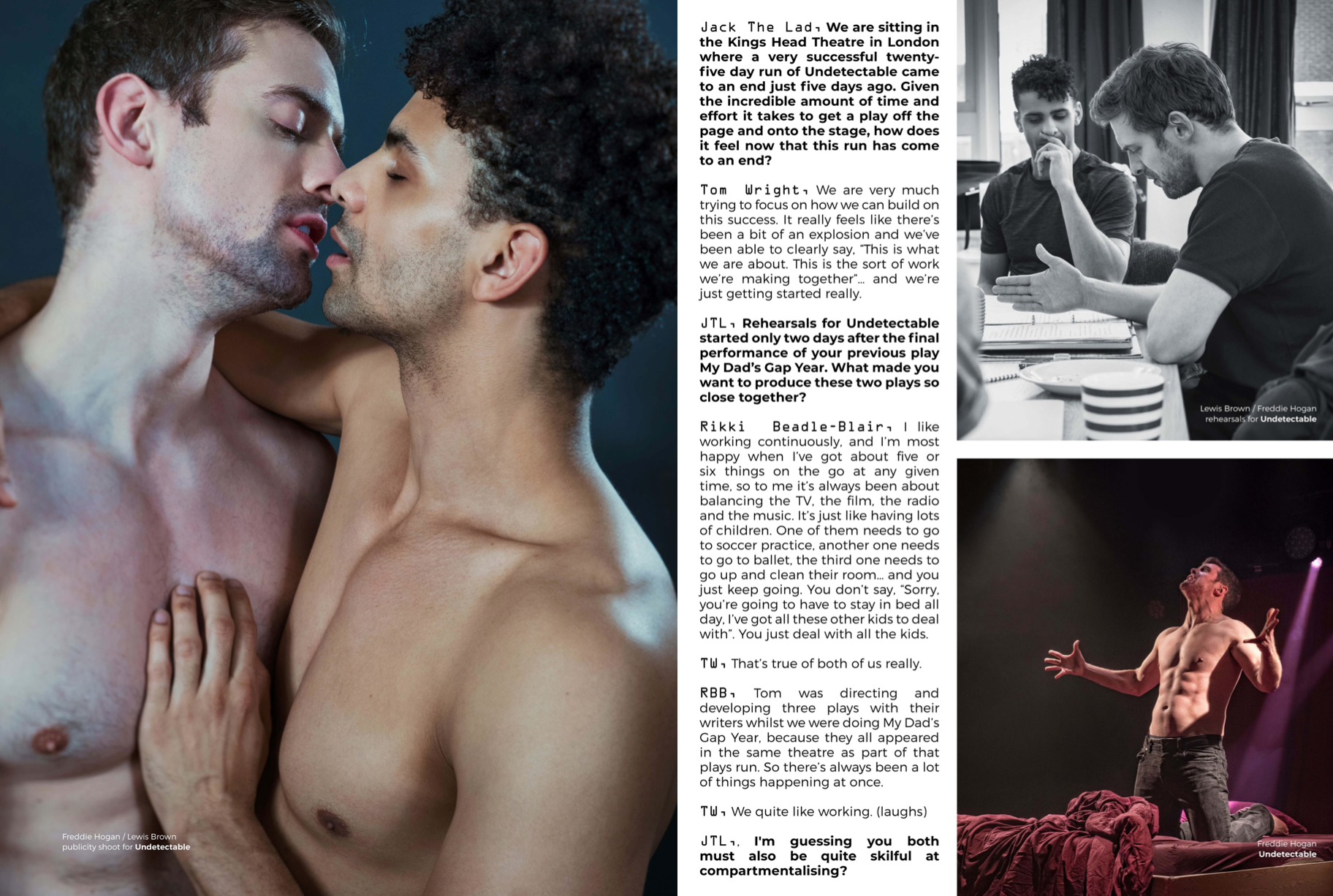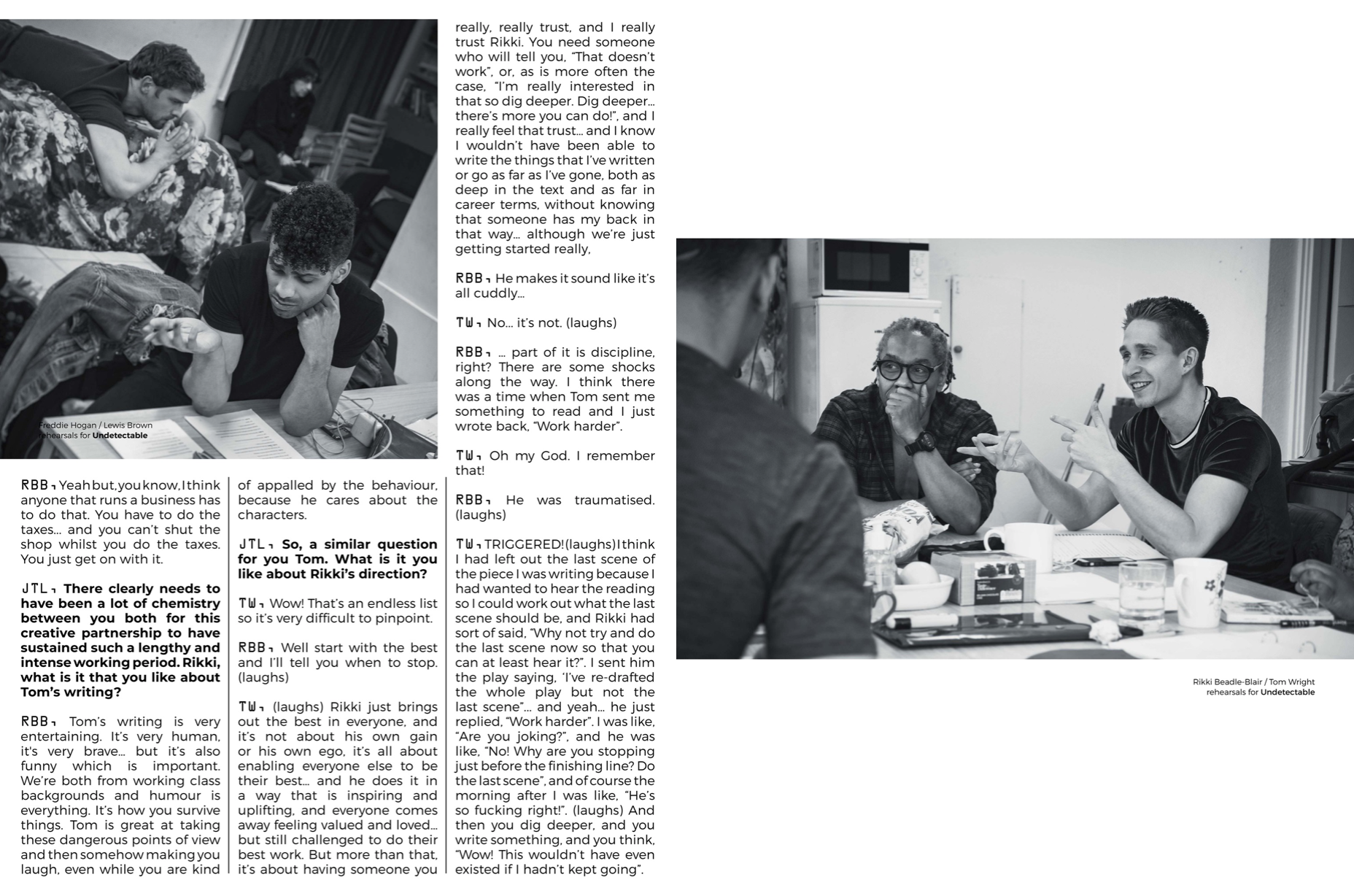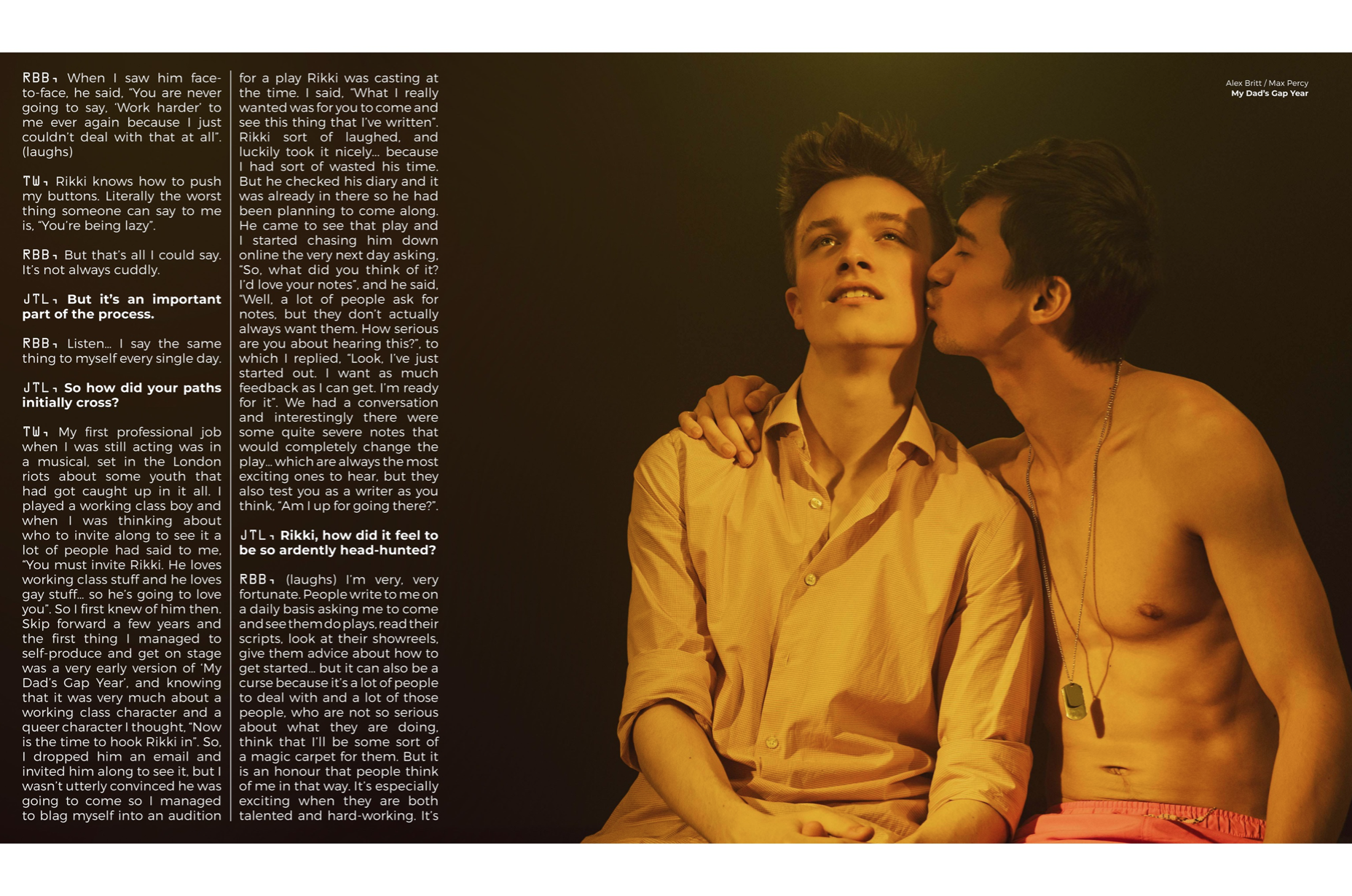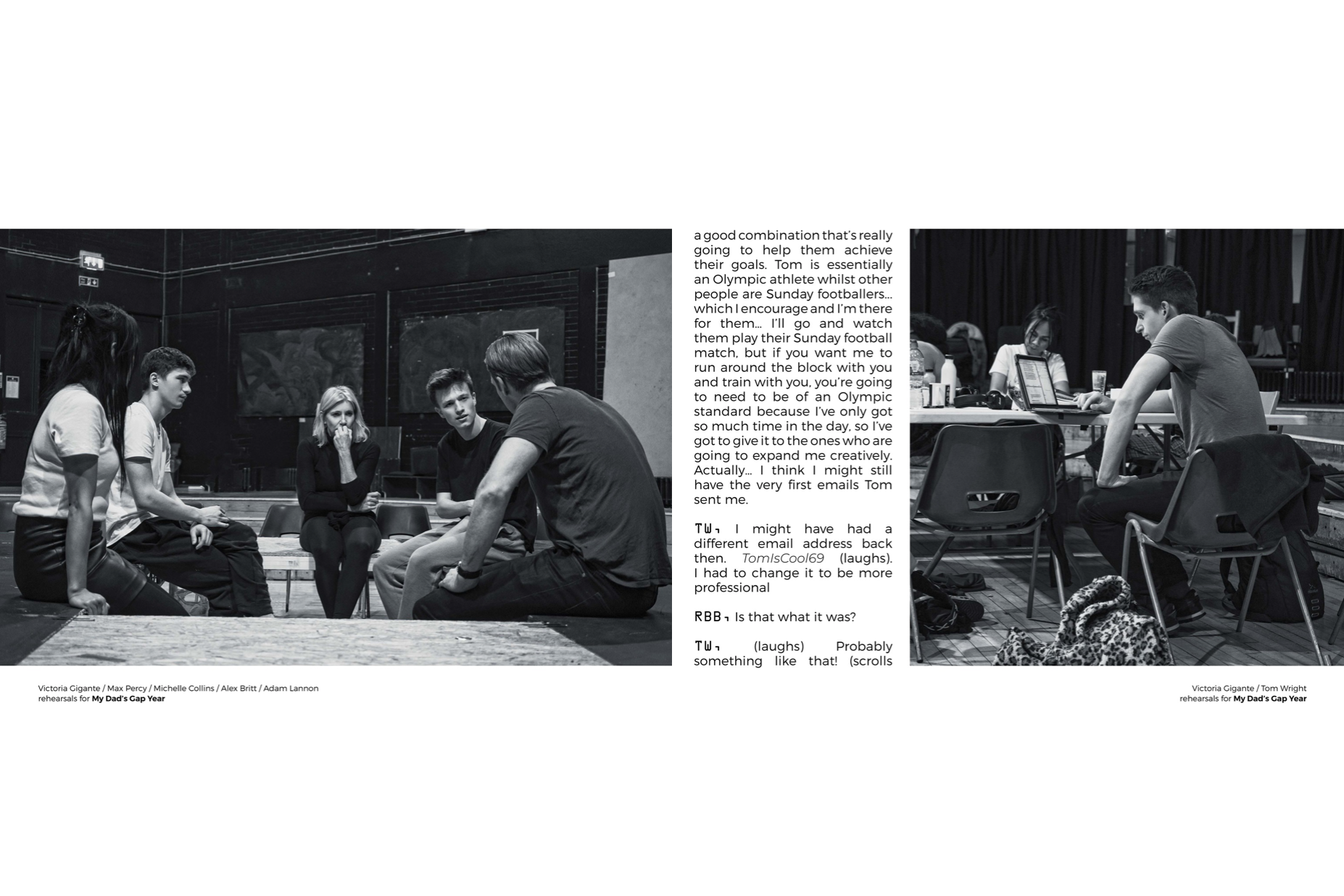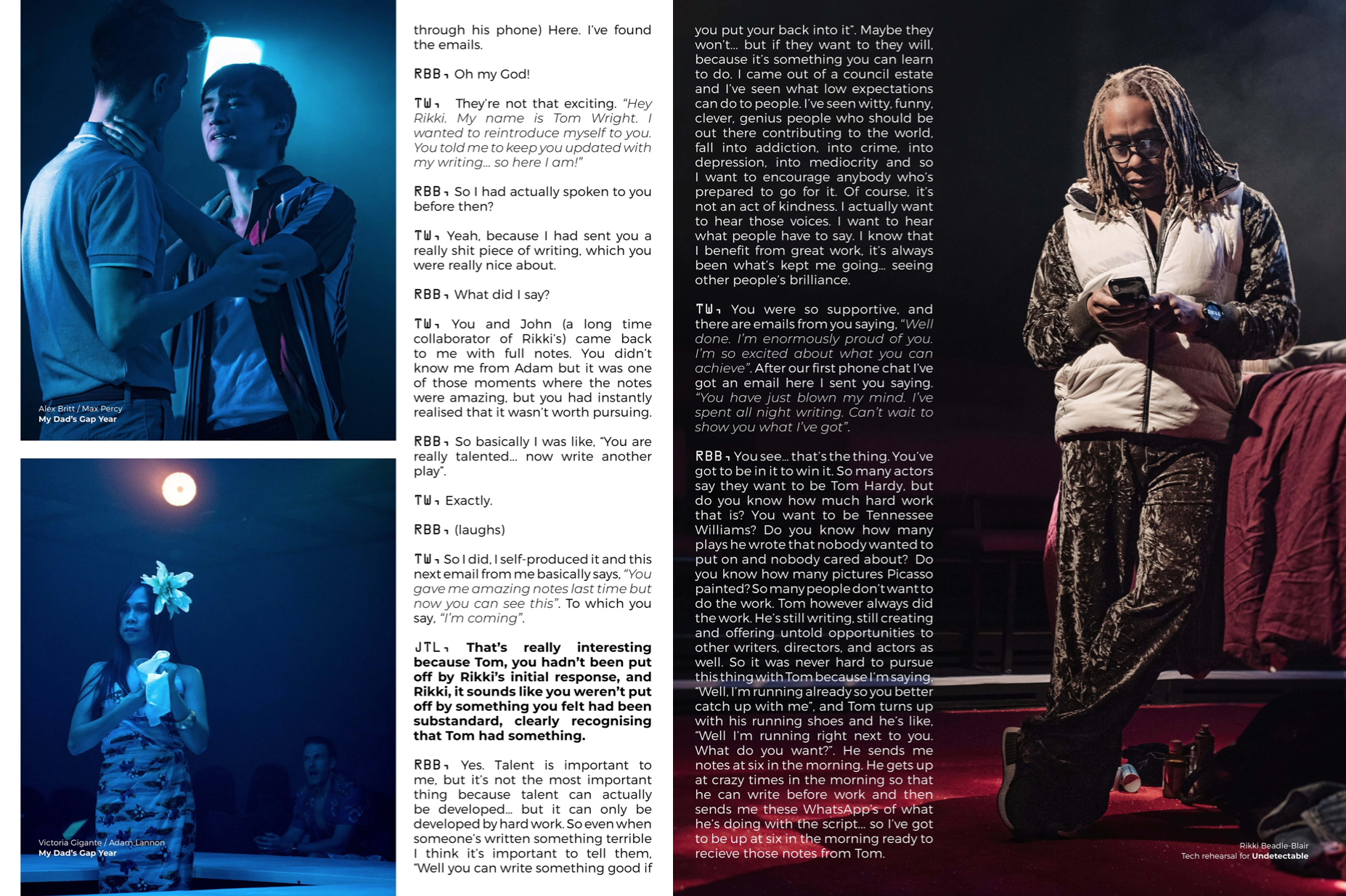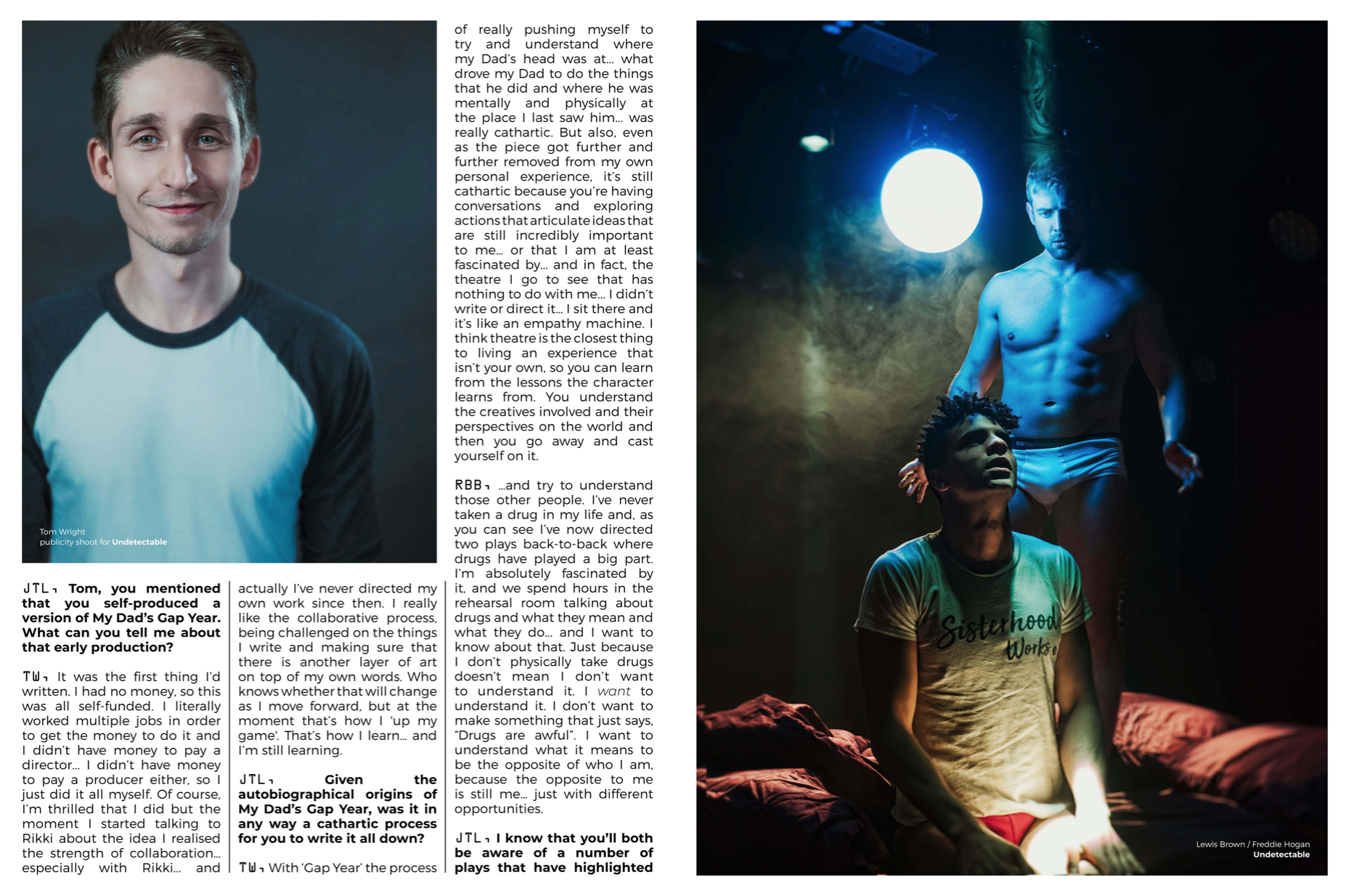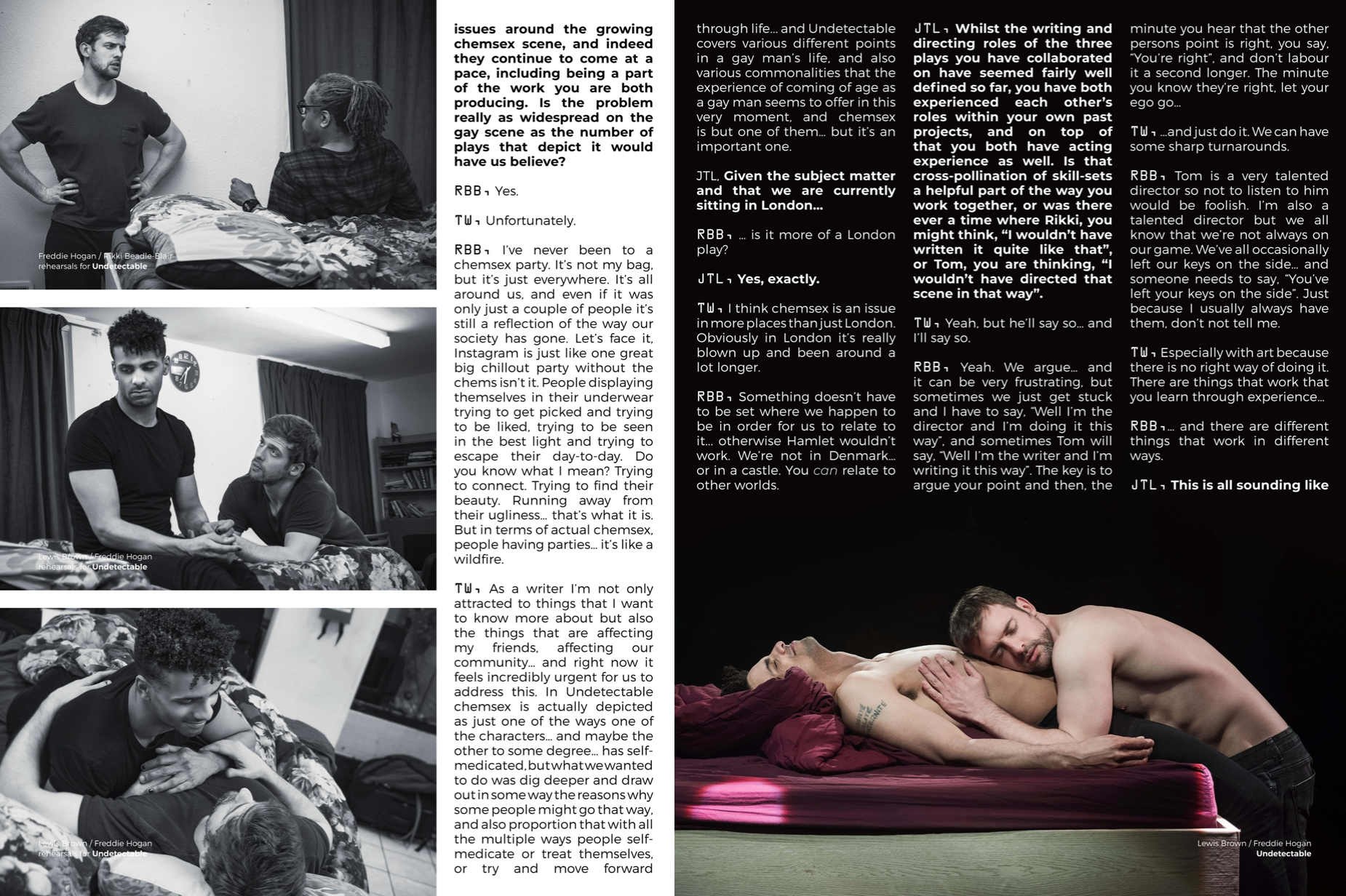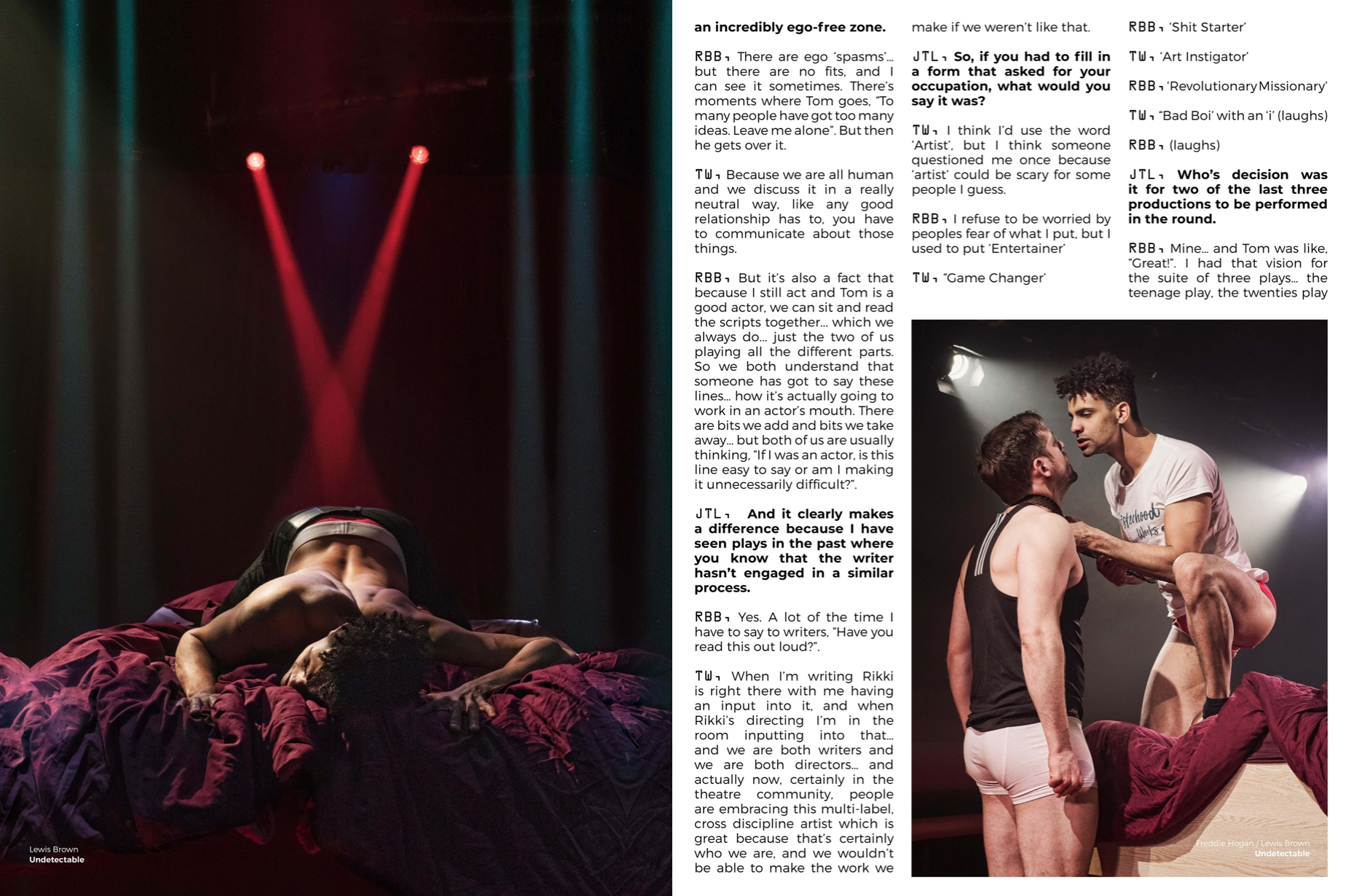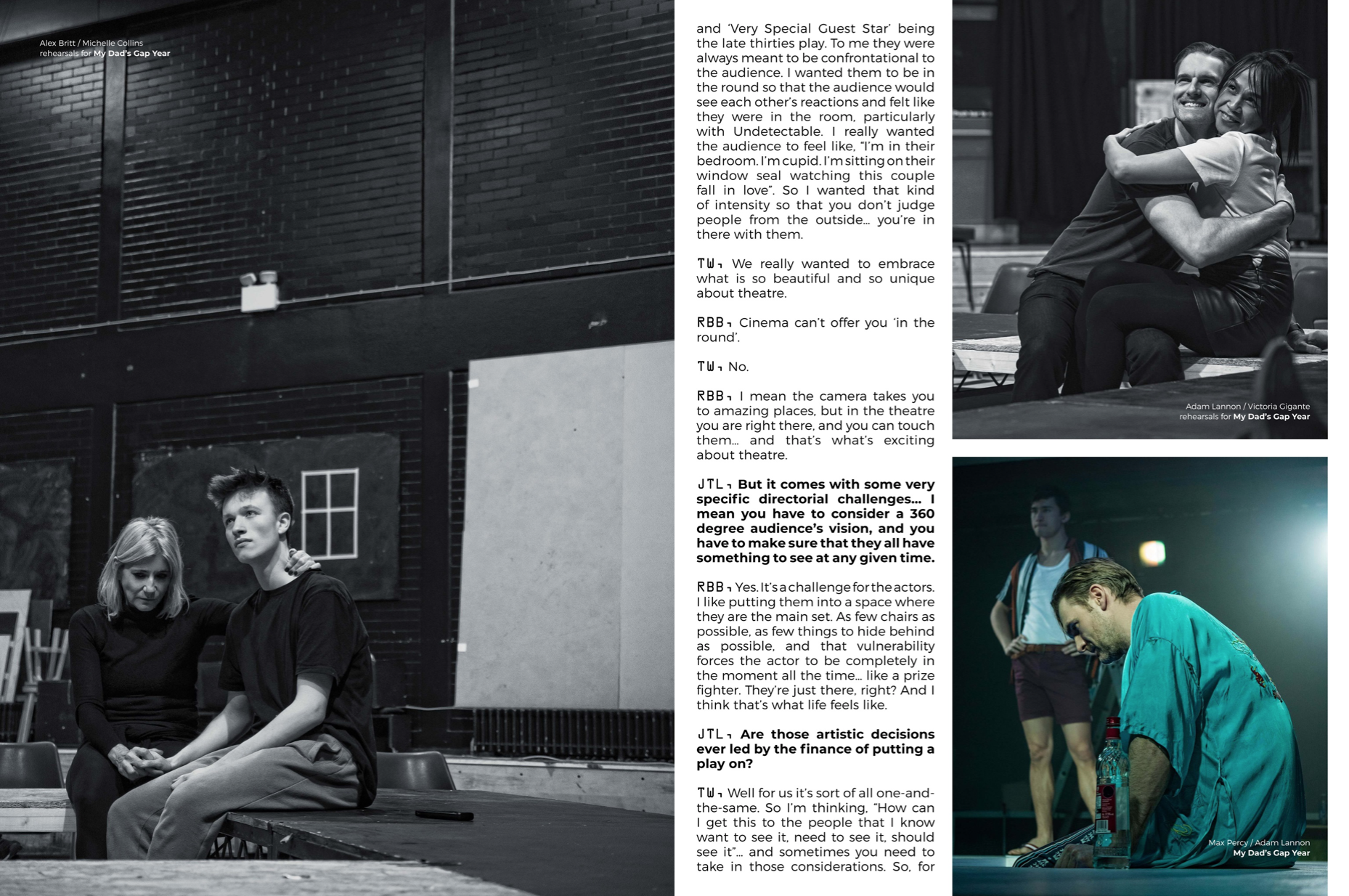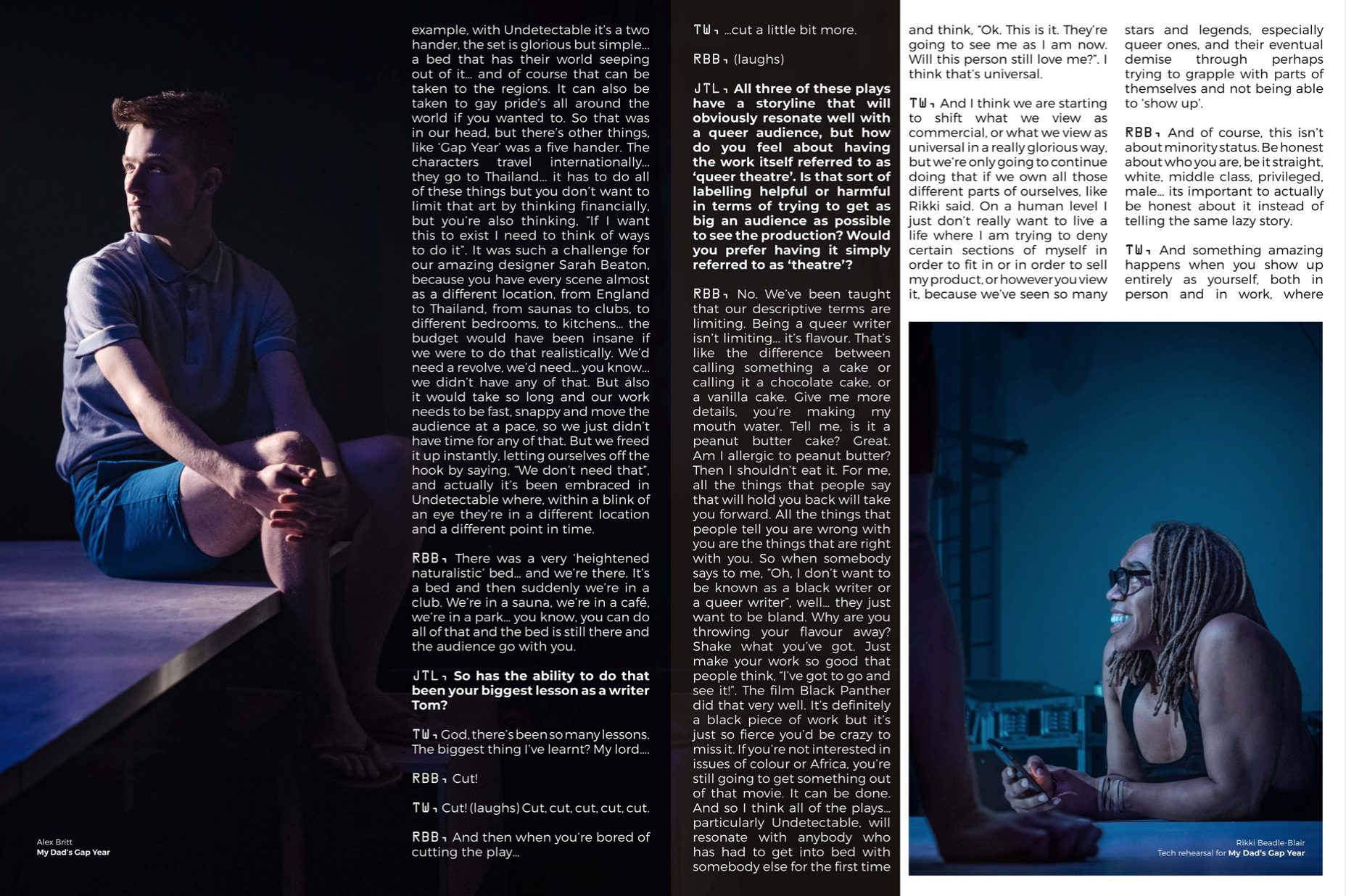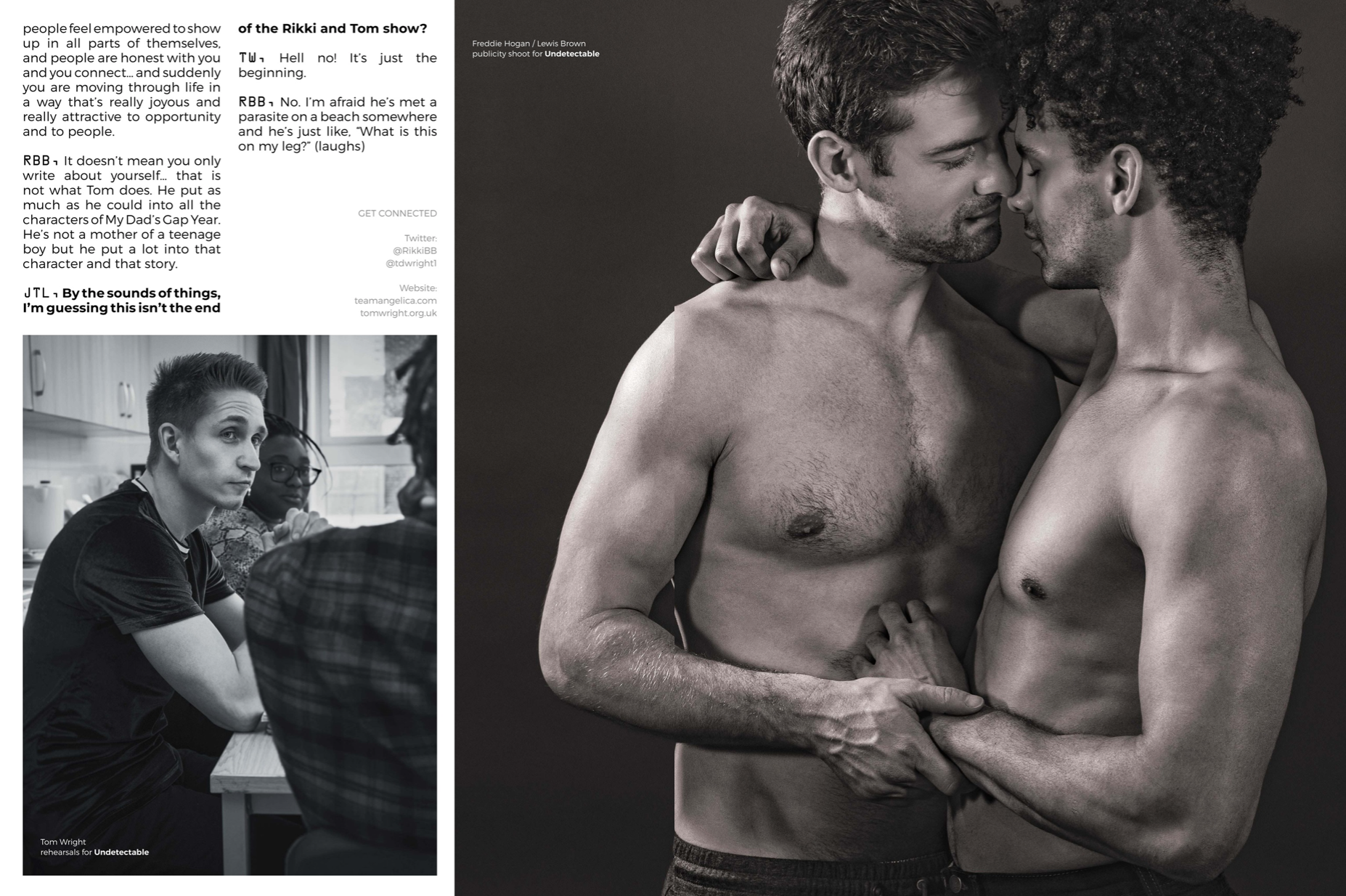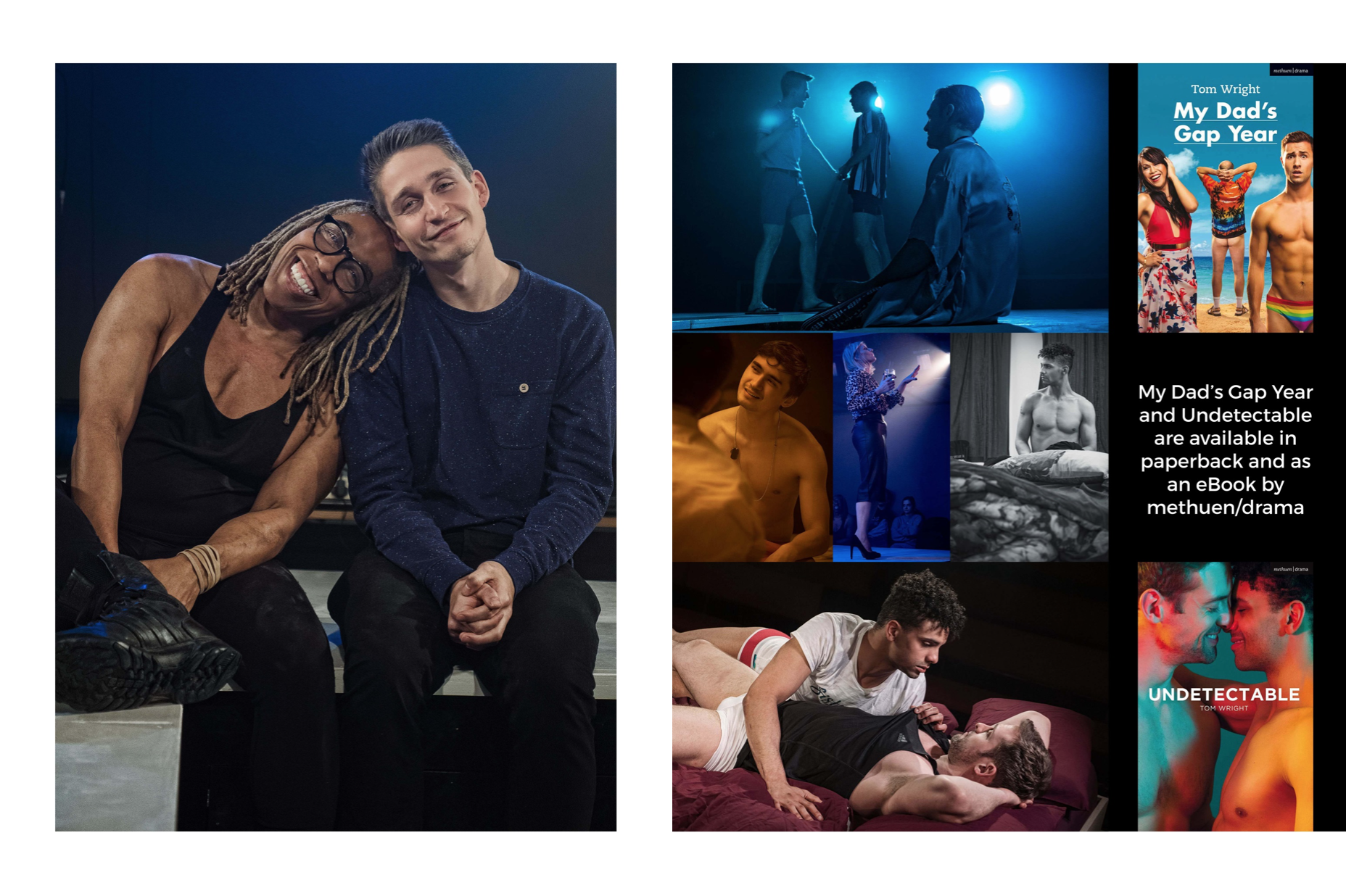Congratulations on these two plays and on your new film! How have you been during the COVID-19 pandemic?
It’s been a mixed bag. Leaving personal challenges aside, it was terrifying watching the whole theatre industry close down overnight. This art form that so many of us have dedicated our lives to fell into a coma, with no known diagnosis or sign of recovery. Almost all of my freelance projects got cancelled over the course of just a few weeks. I fell between the gaps of government support, but I was still one of the lucky ones.
My part-time position as the New Work Associate at the Kiln Theatre continued, albeit in strange and challenging circumstances. That focus kept me sane, alongside writing two new plays: Sirens and White Lies. Eventually, new roots began to appear slowly. Old projects were replaced with new ones - online work, filmmaking, coaching—which went some way to filling the financial and creative void.
Theatres are now open again, but everything feels so tenuous. I’m very interested to see how the sector responds practically, politically, and artistically to this seismic, historical shift in our human experience. Particularly as theatre-makers, we’ve really had to ask hard questions about the form and why we have the right to invite people to experience theatre live and in person. This could galvanise interesting formal experiments and progression in the field. It’s just such a shame that it had to come at such cost.
What I thought particularly powerful about these works is how daring they are—both in terms of content and in terms of language. Are there any directions that you’d hesitate to take?
Both Very Special Guest Star and I Ain’t Dumb have really pushed me to dig deeper into the LGBTQ+experience and to look further into myself.
As writers, it’s our mission to uncover new truths. Things we somehow know but haven’t yet admitted or given voice to—to encourage new ways of seeing the world. My long-term collaborator Rikki Beadle-Blair says that if the projects don’t scare us a little bit, then it’s probably not worth the years it takes to create them and get them produced—let alone worthwhile of the audiences’ hard-earned time and money.
Theatre is such a weird and strange ritual that we’re asking people to engage with. No one enjoys being trapped between rows people watching something rotten. It’s our duty as theatre-makers to offer something spectacular.
Let’s begin with Very Special Guest Star. As in My Dad’s Gap Year, you explore the father-son relationship. What attracts you to it?
The father-son relationship can be such an important bond, but for gay men, it’s often one that is fractured or torn by the pressures of masculinity or homophobia. This sad truth gives way to the potential for drama, and an opportunity for some reparative healing.
Very Special Guest Star really heats this relationship dynamic to a boil. We are introduced to Michael and Phil, two gay men who are literally dads as well as ‘daddies’. Both have experienced challenging relationships with their own fathers and are now looking to change those patterns consciously with their adopted son, as well as less consciously with their much younger sexual partner or ‘third’.
Sex is a place where traumas of all kinds can be safely played out, explored, or sometimes even repaired. By looking at fatherhood through a gay lens, and then digging deeply into the sexual angle, we aim to illuminate various fascinating and knotty connections.
It’s interesting how Michael argues that becoming a parent shouldn’t mean adopting a bourgeois lifestyle. It’s nevertheless clear that Michael’s and Phil’s relationship has reconfigured after they adopted a child. Are these forms incompatible?
Lots of queer people are asking: are there alternatives to raising children? There are certain practical requirements that need covering in parenthood, but queer people have been reinventing family structures for decades with great success. For example, there are rising numbers of poly-people raising children in broader family structures. The main setback for these methods succeeding is how so much of our society is still built to support and uphold heteronormative values. That’s what has forced Phil and Michael to adopt certain stereotypical roles and unhelpful or limiting hierarchies.
In a way, Quasim helps Michael’s and Phil’s relationship by exposing some of its problems. Can it survive?
As relationships so often do, Quasim becomes a mirror that reflects Michael and Phil back to themselves. They have gotten this far by adopting the very middle-class/ British technique of bottling up issues and not speaking about them, which is what we see them do at the end of the play. It’s unclear if Quasim’s arrival and the events of the play are enough to disrupt their path. In a way, that’s what the play is asking: what will it take to galvanise real change? Is it possible?
Quasim could have been a part of Michael’s and Phil’s family six years ago, and in the present, they welcome him into it when they see that he is in need. Tell us about your thinking here.
Phil and Michael entertained the idea of welcoming Quasim into the family six years ago, but ultimately they refused to adopt him. He was too damaged. Too gay. Too ‘other’. They were too easily guided by a swarm of unspoken ‘concerns’.
They do try and help Quasim as an adult during the course of the play, but he rightly questions their motives. do they only want to help him now they want to sleep with him? To alleviate their own guilt? To feel good about themselves?
Quasim is very likely lying throughout the play, yet he doesn’t seem to have approached Michael and Phil with a plan in mind. What keeps him going? What does he hope to get out of this?
Quasim’s motives remain much more opaque to the audience throughout most of the play. But other than failing to make it clear who he really is (though never denying or lying about it), he’s actually always honest. At one point he even says outright ‘I want you to feel how you made me feel’ which is what he goes on to do. He tempts Michael and Phil to a position where they want him to ‘adopt’ them, before abandoning them. Through finally receiving their acceptance, Quasim gets the closure he needs to heal and move on. Meanwhile, Phil and Michael are left squirming like he was all those years ago.
Quasim never expected to see Michael and Phil on the night of the play and therefore does not have a plan for how things will unfold. He’s figuring things out step by step, fuelled with curiosity, open wounds, and desire. despite having more knowledge then Michael and Phil, I don’t think Quasim has any clear idea where the night will lead him. All three characters flip in and out of control as the story progresses.
Have you thought about a possible backstory for Quasim?
It’s exposed in the sexual roleplay section. At this stage, Michael and Phil, as well as the audience, are unsure if the story Quasim is describing his own origin story or a sexual fantasy. But as the play progresses, it becomes more likely to be true. We then learn about the next chapter of Quasim’s life, after his first encounter with Michael and Phil, through his emotive monologue delivered whilst tied up. The striking image of this almost-naked boy pouring his heart out whilst in literal bondage makes for a really theatrical moment!
Now that the play is in production, how has your script developed?
The script changed a lot throughout rehearsals, and then again once we saw how audiences reacted. One of the most satisfying changes was a structural edit to the section where Phil and Michael are on their own, talking about their lives and their desire for Quasim.
Previously, the scene went backwards and forwards as the couple begin to reveal their problematic fetishisation of Quasim, then switching back to more unrelated dialogue and action. I quickly realised going back and forth in this way implied to an audience that we were okay with the way that they spoke about Quasim, which wasn’t the desired effect. This should be the moment when the audiences begin to feel uncomfortable with the couple’s behaviour.
Through structural changes (chopping and changing the text around) the scene eventually went on a straight line from the audience siding with the couple as they expose their vulnerabilities, before gradually moving into more and more problematic discussions. We slowly stretch allegiances and challenge audiences’ perceptions. By the time the couple are behaving at their worst, Quasim re-enters. If we’ve played it correctly, then the audiences are really looking out for him in a way they weren’t before.
I love your use of language in I Ain’t Dumb: every character has his or her own distinctive voice. How did you keep them consistent?
As the play develops, director Rikki Beadle-Blair and I keep digging into the characters, trying to make them as fully formed as possible. We do quizzes about them, quizzes as if we were them. We talk about their family and friends. Intricate details of their histories and individual politics. Even if this doesn’t all make it into the play, this level of detail enriches what they do and how they speak.
Every time we finish a new draft, the control+F is really useful to flick through each character’s lines only, to follow their individual journeys, and to read their dialogue in succession. This helps to finesse and to consolidate the individual flavour of their speech, as well to make sure that they go on a full character arc journey.
What is significant about all of the characters having hyphenated identities?
The action of the play centres on the class of the school children at its heart. It marks their trajectory from celebrating their multiculturalism to gradually becoming more and more divided. In order to have that conversation in the most varied and complex way, we wanted a cast of young characters with multifaceted and nuanced identities. Of course, we can’t cover all identities in one play. But these are young people that I know and understand.
The students are also remarkably young. What is significant about most of them being 15 but living the lives of adults?
Putting conversations about identity in the mouths of 15-year-olds gives loads of potential for both drama and comedy. Young people are really figuring things out in a way that has high stakes for them. They are going to make mistakes. Sometimes they will be ill-informed. But they will also have new ideas that some audiences may not be thinking about.
Why set the school in Coventry?
I grew up in Coventry, in the heart of England, and wanted to represent my city and some of the schools in and around there. Being specific in location also added nuances and complexities to the story, particularly around queer people growing up in a city where there isn’t a thriving LGBTQ+ scene.
Coventry is an interesting place for many reasons. It’s a very diverse and proudly multicultural city, with huge growth and development over the last few years. But some communities are still really deprived, therefore susceptible to the misinformation and divide-to-conquer attitudes that are becoming more and more prevalent in our times. This is what we see in the play.
Cieren is a victim of cyberbullying, but there’s a whole backstory that might encourage us to read him a little differently. Do you identify with him?
Though other characters come down hard on either side, we never quite know what really happened to Cieren and whether he was lying or not. But objectively if Cieren’s sexual experiences were all consensual, he is still too young to legally consent and is clearly unable to deal with the emotional consequences. This is too common for LGBTQ+people, who can struggle to meet like-minded people at an early age, and who therefore seek out more dangerous situations in order to connect and experiment in the ways straight young people get to do more freely.
Cieren has a very toxic relationship with his on-and-off boyfriend Leon. It’s contingent upon them saying things that they don’t mean and treating each other poorly in public. When do they start meaning the things they do say?
If you have a manipulative child, you have to ask: why are they not getting their needs met in other ways? Why have they been forced to learn these tools in order to survive? For me, the actors can have fun deciding what they really mean or when their characters are lying.
Cieren places himself in the most vulnerable positions to provoke responses from Leon, but they are ultimately unpredictable. What makes Cieren endanger himself again and again?
Love. The fear of being rejected or being left alone. Natasha knows there are bigger things out there, but Cieren can’t see beyond his current isolation. Loving Leon is one of the most important things for him, so he is willing to do anything to make it work. Even if it’s making him seriously unhappy. It was really satisfying to explore that kind of young, senseless, toxic love because it’s what so many of us know until we grow up and hopefully grow out of it.
What does Cieren see in Leon?
Leon is charismatic, good-looking, and talented. He believes his skill in football could offer him and, by proxy Cieren, a way out. Cieren also has a problematic fetishisation of blackness and adoration of black culture which he projects onto Leon, even though Leon doesn’t fit neatly into any of those boxes.
In return, Cieren is unpredictable and passionate, and he lives freely as himself. despite Cieren’s going too far, these are inspiring qualities to Leon. Each boy is on opposite sides of the spectrum. Cieren believes he’s liberating Leon through his love, but really he’s trapping him into being who Cieren has decided he is. Meanwhile, Leon is trying desperately to control Cieren through fear. There’s abuse on both sides, which is what makes their relationship so explosive and fun to write.
Amidst it all, we have the well-meaning teacher Ms. Senabo, who hopes to do social good. Could she (or we) do more? Or is it all a lost cause?
We need to balance hope with honesty about our current situation. Getting that balance right should provoke and then inspire audiences to actually do something in response to the work.
Ms. Senabo is just starting her career and still has a lot to learn, but she represents those brilliant teachers who are thinking outside the box and trying to change the systems and students’ lives. She does have a positive effect on Natasha over the course of the play, but ultimately Natasha just can’t escape her suffocating circumstances. This begs the question: young people are ready to succeed, but is the world ready to enable them to do so?
You have moved from writing to directing, with ‘Stockholm’. What has the change been like?
Having worked in the theatre industry for around ten years, I was keen to develop my skills into different modes of storytelling. After dabbling with long-form TV drama, I settled upon filmmaking as the structure suits my ideas. I love the purity of vision in film, and am revelling in the potential it’s opening up in the stories we want to tell.
I’d always been directing theatre alongside my own writing, though typically other writers’ work. I have only directed my own new plays for the first time recently with the double bill Sirens and White Lies. My regular collaborator Rikki Beadle-Blair was still on board, this time as a dramaturg and outside eye.
When we finally got ‘Stockholm’ off the ground, the producer asked me if I was going to direct it, and until then I hadn’t realised that was an option. I instantly said yes, unsure as to when I’d get that option again. As I was a co-producer on the project, it didn’t feel like there was anyone to let down other than myself, so we went for it. It was a brilliant experience and I learnt more actually directing a film from start to finish than I ever would on a course or through mentorship. This was helped by the brilliant team that my co-producer Darius Shu and I put together. They all supported me throughout the process and created brilliant work.
You have worked with Alex Britt and Max Percy before. What led you to cast them here?
Because this was my first film, I wanted to work with actors whom I trusted and who would trust me in this new form. Alex and Max are both incredibly talented, and we have spent hours and hours talking about LGBTQ+issues and characters’ psychologies, so we could jump into ‘Stockholm’ with a shorthand and pre-built knowledge.
We were also filming in the middle of the COVID-19 pandemic and I wanted to work with actors who I knew would feel comfortable being honest about their feelings and what they did and didn’t want to do on any given day. Obviously, we were as safe as possible, but I didn’t want anyone to look back and regret making work during a global pandemic.
What led you to disrupt chronology with this film?
‘Stockholm’ was inspired by the saddening and way-too-high statistic that over 50% of gay, bi, or queer men have experienced sexual assault. When this particular trauma is inflicted on gay, bi, or queer men, it often compounds pre-existing sexual shame, causing nuanced and specific consequences to both individuals and our community as a whole.
As the vital Me Too movement continues to resonate, we want to ensure male survivors are included in the conversation. So the mission of the film was to explore truthfully their knotty experiences, which still too often remain taboo.
These questions motivated us to create a new visual language for the film—almost entirely devoid of dialogue—that we hope creates a unique visceral tone that’s conducive to our mission. Our intention was to recreate the complicated experience of trauma memory, which included a disrupted chronology, as the character gradually pieces together the fragments of their traumatic memory.
Due to the nature of shame, we felt that many male survivors were more likely to watch a film that could be easily received digitally or experienced in private. But as shame is a social problem, it is best dissipated through social situations, so we’re delighted that the film will be experienced communally at LGBTQ+ film festivals and hopefully beyond.
Alex is attracted to Ed, notwithstanding how he abused Alex sexually. Why?
It’s common for survivors of sexual abuse to feel strong, complicated, and even sexual feelings towards their perpetrator. This is a complicated truth, which often creates huge shame for survivors that might stop them seeking help or moving on. These feelings are partly born from a Stockholm Syndrome scenario where that other person is the only person who was there at this huge pivotal moment.
For Alex (the character Alex plays is also called Alex), seducing Ed is also a less-painful way of rewriting his story. If he was always attracted to Ed (Max’s character) then does that mean it was consensual and therefore less traumatising? If he is able to seduce Ed now, then will the feeling of rejection be any less? Would that give him the power to rewrite their past or at least decide the ending of the story?
Ed remains a mystery to us. What kind of backstory do you envision for him?
The film centres on Alex’s experience, so we only know as much as he does about Ed. Ed needs to remain clouded in mystery in order for Alex to unpick who he is and what really happened. But I wanted the film to have some empathy towards Ed. He is a conflicted young gay man who makes an awful decision to use another person to experiment or to understand himself. A decision driven by shame and fear. Obviously there is no reason good enough to abuse someone in this way, but I did want to understand why someone might go down this path.
Part of Alex wants to make Ed feel better, even now, which is why he allows him to leave, thinking the consequences of his actions weren’t severe. But I didn’t want Ed to get away so lightly, which is why he returns and catches a glimpse of Alex’s real pain. He has to live with that knowledge and guilt for the rest of his life, whereas Alex has a chance to move on.
Alex’s life goes on a downward spiral, which we learn about through short sequences. What makes Alex finally seek help and why?
The montage sequence was a real challenge to shoot and edit, but we’re so proud of it. Alex’s performance is heartbreaking, and it really shows how the ripple effects of abuse can vibrate through an entire life—or at least the start of one. It’s clear that, despite Alex’s resilience, the abuse is affecting his relationships, sex life, and self-worth, which is what ultimately drives him to meet Ed. He seeks to confront his demons and find out the truth of what happened, buried deep beneath the stories he’s told himself in order to survive. Once he’s revisited the trauma and understood the rape for what it is, it felt important to show audiences that there is support out there. You don’t have to move forward alone.
This interview offers some insights into your program, which uses theatre and now film as platforms to raise awareness of and to stimulate conversation regarding pressing sociocultural questions. Imaginative arts help us heal, and their potentialities are even more important in this age of crisis. As we slowly emerge from the COVID-19 pandemic, what is next for you?
We’ve made another short film called ‘Sent To Cov’ in collaboration with Sky Arts. It tells the story of a queer women of dual-heritage, nervously bringing her loving but boujee partner back to her hometown of Coventry for the very first time.
After that, I’d love to focus on making my first feature film or TV series. In terms of theatre, it’s time to scale up the work and collaborate with mid- or large-scale theatres to reach wider audiences. I’m currently writing a new commission for a major British theatre, so I’m looking forward to bringing that to fruition. Watch this space!

